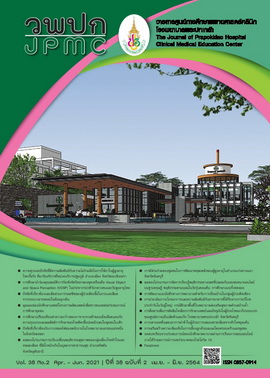Strengthening Breastfeeding by Family and community
Main Article Content
Abstract
Thailand's exclusive breastfeeding rate remains below the global average and the lowest in Southeast Asia. Therefore, there is a need to strengthen breastfeeding by involving families and communities; this effort relies on 6 main guidelines: 1) creating or enhancing skills 2) creating or increasing participation 3) creating or increasing the owner 4) creating partnerships with agencies and organizations 5) development of public policy and 6) budget support. It is important for stakeholders such as mothers and fathers, their families, communities and societies around the world to take action to strengthen breastfeeding. Government and community leaders should create policies to transform objectives into concrete practices and strategies that drive and support practitioners to carry out activities that successfully promote breastfeeding and pass on the value of breastfeeding to future generations. Finally, systematic management of knowledge is important in promoting breastfeeding must accommodate changes to the world situation, such as the case of emerging infectious diseases. The contemporary challenge of Coronavirus 2019 (COVID 19), for example, is currently affecting the promotion of breastfeeding; the response to this challenge can help set guidelines that practitioners can apply to suit local contexts.
Article Details
References
UNICEF Thailand. Inequality the gap, child and women problems survey of the children and women in Thailand, 2012; 2013. Bangkok: UNICEF Thailand; 2014.
National Statistical Office and UNICEF Thailand. Survey of the situation of children and women in Thailand 2015 – 2016. Bangkok: UNICEF Thailand; 2017.
Ministry of Public Health. Indicators of Department of Health, Ministry of Public Health 2015. Nonthaburi: Department of Health; 2015.
Ministry of Public Health. Indicators of Department of Health, Ministry of Public Health 2017. Nonthaburi: Department of Health; 2017.
Ministry of Public Health. Indicators of Department of Health, Ministry of Public Health r 2018. Nonthaburi: Department of Health; 2018.
World Health Organization. World breastfeeding week [internet]. 2016[cited 2021Jan 12]. Available from: http://www.who.int/mediacentre/events/2016/world-breastfeeding-week/en/
World Health Organization. Breastfeeding [internet]. 2018 [cited 2018 Jan 26]. Available from: http://www.who.int/topics/breastfeeding/en/
World Health Organization. 10 facts on breastfeeding [internet]. 2017[cited 2018 Jan 26]. Available from: http://www.who.int/features/factfiles/breastfeeding/en/
Office of the National Economic and Social Development Council. 12th National Economic and Social Development plan 2017-2206 [Internet]. 2018. [cited 2018 Jan 12]. Available from: https://www.nesdc.go.th/ewt_dl_link.php?nid=6422
Suvetwethin D. Strong and sustainable community with cooperation from workshop of Thai health promotion foundation for information management to research and local community development [internet]. 2017[cited 2021 Jan 12]. Available from: https://www.thaihealth.or.th/Content/34992-สร้างชุมชนเข้มแข็งยั่งยืน-ต้องร่วมมือร่วมใจ.html
Tumlangka S. Local wisdom - based model to build up community strength in Chiang Rai province. Journal of Education Naresuan University. 2013; 15(2): 58-66.
Cetthkrikul N, Topothai C, Topothai T, Pongutta S, Kunpeuk W, Prakongsai P, et al. Situation of breastfeeding among mothers receiving services in public hospitals in Thailand. Journal of Health Science 2016;25(4):657-63.
Mekkamol K. Breastfeeding promotion: community practice guideline. The Southern College Network Journal of Nursing and Public Health 2018; 5(3):274-86.
Netgrajang C, Nuntaboot K, Theerasopon P. Strengthening child rearing system during early childhood (0 - 5 years) by the community. Journal of Nursing Science & Health 2014;37(4):83-94.
Winichagoon P., Damrongwongsiri O. Breastfeeding situation, facilitators and obstacles, policy and program to promote breastfeeding in Thailand. Journal of Nutrition Association of Thailand 2020; 55(1):66-81.
Payakkaraung S, Sangperm P, Samart C. Breastfeeding problem in early postpartum period: mother’s experiences. J Nurs Sci 2016; 34(3):30-40.
Khonboon R, Wattananukulkiat S. Effects of father’s role promoting program on support behavior and duration of exclusive breastfeeding. Journal of Nursing Science & Health 2017;40(1):41-52.
Ngamgarn W., Leesiriwattanagul W., Perksanusak T., Nuampa S. Effect of a Nursing Program for Continuous Breastfeeding Promotion with Family Support and Early Skin to Skin Contact on Effective Suckling Breastfeed, Neonatal Jaundice, and Exclusive Breastfeeding at One Month. The Journal of Prapokklao Hospital Clinical Medication Education Center 2021; 38(1):67-76.
Netgrajang C. Strengthening Multidisciplinary Approach to Prevent and Control Complications of Diabetes Mellitus in Pregnant Women. The Journal of Prapokklao Hospital Clinical Medication Education Center 2019; 36(2):168-177.

